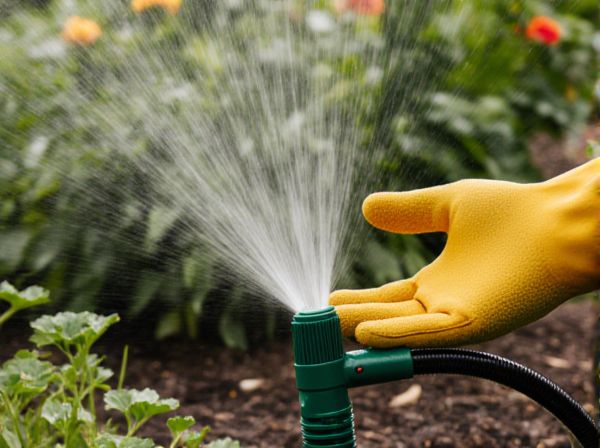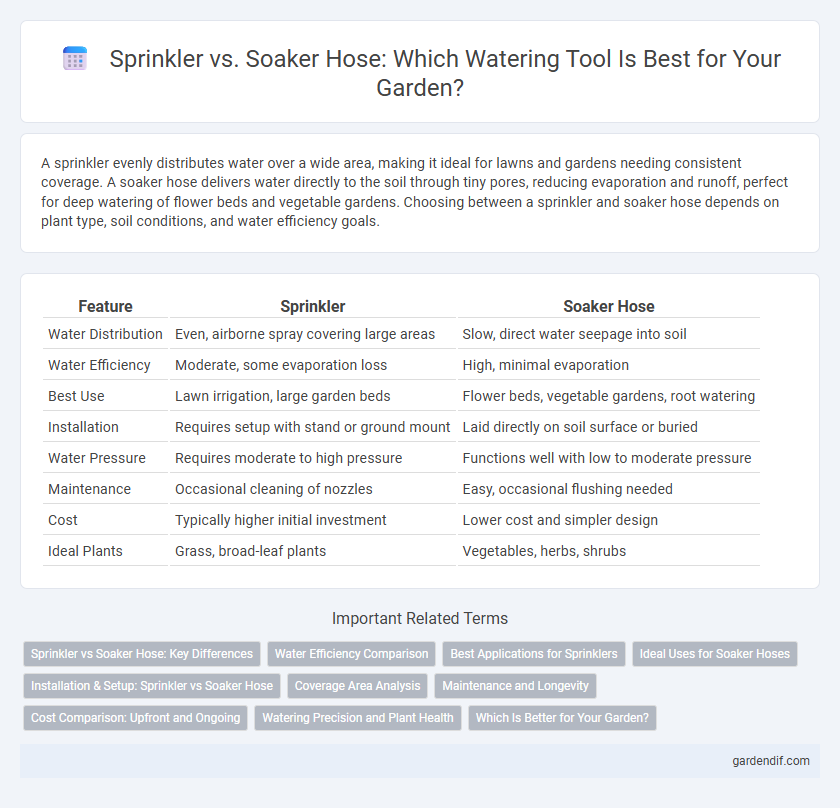
Sprinkler vs Soaker Hose Illustration
A sprinkler evenly distributes water over a wide area, making it ideal for lawns and gardens needing consistent coverage. A soaker hose delivers water directly to the soil through tiny pores, reducing evaporation and runoff, perfect for deep watering of flower beds and vegetable gardens. Choosing between a sprinkler and soaker hose depends on plant type, soil conditions, and water efficiency goals.
Table of Comparison
| Feature | Sprinkler | Soaker Hose |
|---|---|---|
| Water Distribution | Even, airborne spray covering large areas | Slow, direct water seepage into soil |
| Water Efficiency | Moderate, some evaporation loss | High, minimal evaporation |
| Best Use | Lawn irrigation, large garden beds | Flower beds, vegetable gardens, root watering |
| Installation | Requires setup with stand or ground mount | Laid directly on soil surface or buried |
| Water Pressure | Requires moderate to high pressure | Functions well with low to moderate pressure |
| Maintenance | Occasional cleaning of nozzles | Easy, occasional flushing needed |
| Cost | Typically higher initial investment | Lower cost and simpler design |
| Ideal Plants | Grass, broad-leaf plants | Vegetables, herbs, shrubs |
Sprinkler vs Soaker Hose: Key Differences
Sprinklers distribute water over a wide area using pressurized spray patterns, making them ideal for lawns and evenly irrigated landscapes. Soaker hoses release water slowly through porous material along their length, providing deep watering directly to plant roots with minimal evaporation. Sprinklers suit general coverage, while soaker hoses excel in targeted, water-efficient irrigation for garden beds.
Water Efficiency Comparison
Sprinklers distribute water over a wide area through mist or spray, often leading to evaporation and runoff, which reduces water efficiency. Soaker hoses release water slowly and directly into the soil, minimizing evaporation and ensuring deeper root absorption. Studies show soaker hoses can save up to 50% more water compared to traditional sprinklers, making them a more efficient choice for garden irrigation.
Best Applications for Sprinklers
Sprinklers are ideal for watering large, open areas such as lawns and sports fields where even coverage is essential. They efficiently deliver water over wide surfaces, promoting healthy grass growth and preventing soil erosion. Sprinklers are also suitable for irrigating flower beds and vegetable gardens with their adjustable spray patterns and timing controls.
Ideal Uses for Soaker Hoses
Soaker hoses excel in delivering deep, slow irrigation to garden beds, flower borders, and vegetable patches, ensuring consistent soil moisture without water runoff. Their porous design makes them ideal for watering delicate plants and root systems, minimizing leaf wetness and reducing disease risk. Soaker hoses work best in areas requiring uniform water distribution directly to the soil, promoting healthier plant growth.
Installation & Setup: Sprinkler vs Soaker Hose
Sprinkler systems require precise placement and connection to a water source, often involving stakes, timers, and pressure adjustments for optimal coverage. Soaker hoses simply lay flat along garden beds, connected directly to a water spigot, making installation quicker and more straightforward. The simpler setup of soaker hoses minimizes tools and time, while sprinklers may demand careful calibration and maintenance for even water distribution.
Coverage Area Analysis
Sprinklers typically cover larger areas, ranging from 1,000 to 3,000 square feet, making them ideal for lawns and gardens requiring uniform water distribution. Soaker hoses provide targeted watering with coverage areas usually between 50 to 200 feet in length, suitable for garden beds and plants needing deep soil hydration. Coverage efficiency depends on sprinkler spray radius and hose length, influencing water conservation and plant health.
Maintenance and Longevity
Sprinklers require regular cleaning of nozzles and filters to prevent clogging and ensure even water distribution, which can extend their lifespan significantly. Soaker hoses benefit from occasional flushing to remove sediment buildup inside the tubing, minimizing the risk of blockages and prolonging hose durability. Proper winter storage for both tools, such as draining water and storing in a frost-free environment, is essential to prevent cracking and maintain optimal performance over time.
Cost Comparison: Upfront and Ongoing
Sprinklers typically have a higher upfront cost, ranging from $30 to $150 depending on model and coverage area, while soaker hoses are more affordable initially, averaging $15 to $40. Ongoing expenses for sprinklers include electricity or battery replacements, and occasional maintenance or repairs, which can add up over time. Soaker hoses have minimal ongoing costs, primarily limited to occasional replacement every few seasons and are more water-efficient, reducing water bills significantly.
Watering Precision and Plant Health
Sprinklers distribute water over a wide area with less precision, often leading to water runoff and inconsistent soil moisture, which can stress plants. Soaker hoses deliver water directly to the soil at the root zone, promoting deeper infiltration and reducing evaporation, enhancing plant health by maintaining consistent moisture levels. Optimal watering precision with soaker hoses minimizes fungal diseases and improves nutrient uptake compared to the broader coverage of sprinklers.
Which Is Better for Your Garden?
Sprinklers provide broad water coverage and are ideal for lawns or garden beds needing uniform irrigation, while soaker hoses deliver water directly to the soil, minimizing evaporation and ensuring deep root watering for plants. For water efficiency and targeted hydration, soaker hoses excel in vegetable gardens and flower beds. Sprinklers are better suited for larger areas requiring consistent moisture, but soaker hoses typically conserve more water and reduce weed growth.
Sprinkler vs Soaker Hose Infographic

 gardendif.com
gardendif.com